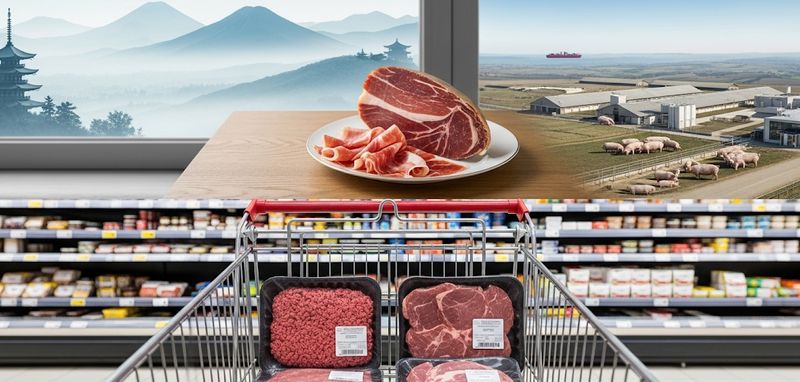
Published in News
Market Pulse: UK Shoppers Seek Value, Spain's Iberico Gains in Japan, and Hungary Targets Asia
UK shoppers are switching to cheaper cuts as prices rise, Spanish Iberico ham gains wider access to the Japanese market, and Hungary invests in boosting its pork exports to Asia.

Bo Pedersen
Chief Revenue Officer
As the summer ends, the market is being defined by consumer responses to inflation and strategic export manoeuvres by key European producers. We break down the latest consumer data from the UK, a significant trade win for Spain in Japan, and Hungary's ambitious export strategy.
UK Market: Shoppers Trade Down as Meat Price Inflation Continues
What happened: The latest grocery market data from Kantar for the four weeks ending 24th August shows that while the value of fresh meat sales is up, volumes are down slightly as consumers react to high prices. The report highlights a clear "trade-down" effect, with sales volumes of cheaper cuts like beef and lamb mince rising, while more expensive steaks and roasting joints have seen a significant decline.
Why it matters: This provides hard data on the consumer response to the cost pressures we have been reporting on all summer. It shows that while shoppers are not abandoning meat, they are actively changing their purchasing habits to manage their budgets. For processors and retailers, this means the volume is now concentrated in lower-margin, commodity products, squeezing overall profitability.
Implications & suggested actions:
Processors: The demand for mince is strong, but this is a low-margin category. Focus on efficiency in your mincing and butchery operations to protect what little margin there is. Explore innovation in value-added mince products (e.g., seasoned or blended) to create a point of difference.
Retailers: Your promotional strategy needs to reflect this consumer reality. Focus promotions on mince, stewing cuts, and pork to align with shopper needs. For more expensive cuts, consider smaller pack sizes or "dine-in" deals that create a perception of value.
Farmers: The strong demand for manufacturing beef to supply the mince market is providing a solid floor for cull cow prices, which is a positive in the current high-cost environment.
International Trade: Spanish Iberico Ham Gains Expanded Access in Japan
What happened: The Spanish government has successfully negotiated an expanded export protocol for high-quality Iberico ham with the Japanese Ministry of Agriculture, Forestry and Fisheries (MAFF). The new agreement will allow a wider range of bone-in and processed Iberico products to be sold in Japan, which is a key high-value market for premium European meats.
Why it matters: This is a significant win for Spain's premium pork sector and follows the success of the Serrano ham consortium we noted on August 25th. Securing access for a wider range of products in a sophisticated and high-paying market like Japan is a perfect example of a value-over-volume export strategy. It reinforces the global appeal of Europe's geographically protected and high-quality meat products.
Implications & suggested actions:
Spanish Iberico Producers: This is a major opportunity. Work with your importers and distributors in Japan to educate chefs and consumers about the new range of products now available.
EU Competitors: Spain's success in negotiating detailed, product-specific market access is a model for other EU countries with their own protected meat products. This demonstrates the value of targeted government and industry collaboration.
Importers & Distributors (Japan): The expanded range of Iberico products offers a chance to differentiate your portfolio. Use this opportunity to create new tasting menus and retail offerings that highlight the unique qualities of different types of Iberico ham.
Eastern Europe: Hungary Invests to Boost Pork Exports to Asia
What happened: The Hungarian government, in partnership with the country's main meat industry body, has launched a new investment programme to modernise its pork processing sector. The initiative is explicitly aimed at increasing the volume and value of pork exports to key Asian markets, including South Korea, the Philippines, and Vietnam. The funding will be targeted at upgrading cutting, deboning, and packaging facilities to meet the specific requirements of these export destinations.
Why it matters: This is a clear, state-backed strategic push to establish Hungary as a more significant player in the Asian pork market. As we reported on August 21st, EU pork is facing intense price competition from the US in Asia. Hungary's strategy is to compete by investing in the specific product quality and specifications that Asian buyers demand, a smart move to capture a higher value share of the market.
Implications & suggested actions:
Hungarian Processors: This is a direct opportunity to secure co-funding to upgrade your facilities. Prioritise investments that will help you meet the certification standards of high-value Asian markets.
EU Competitors (e.g., Spain, Denmark): The competition for Asian markets is intensifying. The fact that national governments are now directly investing in export-focused infrastructure highlights the strategic importance of this trade.
Logistics & Cold Chain Providers: This export push will create new demand for specialised, refrigerated logistics services from Hungary to Asia. There are opportunities for providers who can offer reliable and cost-effective sea and air freight solutions.
Sources
Kantar UK Grocery Market Report - 4 w/e 24 August 2025 (1 September 2025)
Spain secures expanded market access for Iberico ham in Japan - Spanish Ministry of Agriculture, Fisheries and Food (MAPA) (29 August 2025)
Hungary announces new investment program for pork export sector - Hungarian Ministry of Agriculture (1 September 2025)
